- Crypto laws, including GENIUS and CLARITY, are set for final action by September 30.
- Coinbase, FHFA, and lawmakers back major reforms for stablecoins and crypto markets.
- FHFA now allows cryptocurrency to count as mortgage assets, boosting real-world use.
The White House has also established a firm deadline for enacting crypto legislation, with the AI & Crypto Czar, David Sacks, indicating that the market structure bills will be completed by September 30. July will be a turning point, with the GENIUS Act set to reach the bill-signing phase, while CLARITY will head to the Senate.
Senate Banking Committee Chair Tim Scott and Digital Assets Subcommittee Chair Cynthia Lummis are spearheading the legislative effort with an official agenda. The agenda includes bill introduction before the August recess, markup during the first week of September, and completion by the end of the month. The CLARITY Act focuses on market structure bills, while the GENIUS Act focuses on stablecoin structures. Both bills are supported by President Trump.
Industry Leaders Welcome Legislative Progress
Coinbase CEO Brian Armstrong expressed gratitude for the White House’s commitment to work with Senate leadership on delivering market structure legislation by the September deadline. The timeline provides cryptocurrency companies with concrete expectations for regulatory clarity that has been lacking for years.
Armstrong specifically thanked bipartisan partners in both chambers of Congress for their efforts to advance the legislation. The bipartisan support suggests these bills have a realistic chance of passage despite potential political divisions on other issues.
The legislative push comes alongside policy changes at federal agencies. FHFA Director Pulte announced that Fannie Mae and Freddie Mac must prepare their operations to count cryptocurrency as qualifying assets for mortgage applications.
Federal Housing Giants Embrace Crypto Assets
The FHFA directive shows a major shift in how government-sponsored enterprises approach digital assets. Following a thorough study, the agency concluded that cryptocurrency assets can be applied in mortgage qualification, which is consistent with Trump’s idea of crypto capital leadership.
This policy change can potentially unlock substantial demand for cryptocurrency as Americans seek to access their digital asset balances for property transactions. Validation by the mortgage industry of crypto assets further legitimizes and makes digital currencies more useful for purposes other than speculative investing.
The FHFA decision follows months of deliberation about the treatment of cryptocurrency in traditional financial applications. The agency’s conclusion that crypto assets should be considered in mortgage underwriting represents a significant shift from traditional regulatory thinking.
Related: Arthur Hayes on Stablecoins, Geopolitics, and Bitcoin’s Next Peak
Disclaimer: The information presented in this article is for informational and educational purposes only. The article does not constitute financial advice or advice of any kind. Coin Edition is not responsible for any losses incurred as a result of the utilization of content, products, or services mentioned. Readers are advised to exercise caution before taking any action related to the company.







